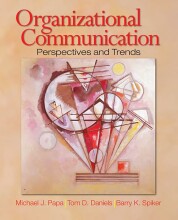Leader-Member Relationships
9 important questions on Leader-Member Relationships
Early Style Theory
Based on “What leaders do rather than their personality traits”
- Laissez-faire: they relinquish control, delegate = essentially displaying “non-leadership”
- Authoritarian: they command & control, monitor & supervise, expect respect & compliance with authority
- Democratic: they guide & coach, share authority, seek input, promote development & empowerment in followers (=participative)
Transformational leadership changes members’ values
Which 4 styles lead progressively to performance beyond expectations?
- Individualized consideration
- Intellectual stimulation
- Inspirational motivation
- Idealized influence
What are the main premises of contingent leadership?
- Leadership behaviour = influence on followers
- No single leadership style is ideal for all situations
- The success of a particular style is contingent on circumstances (e.g. readiness and willingness of followers)
- Leaders should change behaviour to suit the circumstances --> flexibility
- Good leaders, over time, develop a repertoire of skills that covers most contingencies
- Higher grades + faster learning
- Never study anything twice
- 100% sure, 100% understanding
What are contingent factors?
- Situational restraints on leadership effectiveness
- Quality of leader-member relations: the degree of confidence and trust that members have in the leader
- Task structure: the degree of certainty and routine as opposed to ambiguity and unpredictability in the task
- Position power: the influence inherent in the leadership role (legitimate authority and ability to reward or punish)
What are the main premises of Leader-Member Exchange theory (LMX)?
- LMX focuses on the relationship that develops between managers and members of their teams (= followers).
Behaviour differs across the relationships
- In-Group Members: work under conditions of mutual trust, influence, and get support from manager
- Out-Group Members: work under conditions of low trust and support, manager exercises formal authority
- Middle-Group Members: fall between the conditions of in-group and outgroup members
Function of leader = to direct others' activities towards organisational goals
- To encourage compliance by promoting morale and satisfaction
- Morale and satisfaction depend on effective interpersonal relations
- Effective (vs. ineffective) leaders are communication-minded, empathic listeners, sensitive to others, share information, and “ask or persuade” instead of “tell or demand”
- Defensive Communication Climate, communicative behaviors: Evaluation, Control, Strategy, Neutrality, Superiority, Certainty
- Supportive Communication Climate, communicative behaviors: Description, Problem-Orientation, Spontaneity, Empathy, Equality,Provisionalism
- Supportive, “people-oriented” styles of communication promotesatisfaction
What can be said about member behaviour- feedback & distortion?
- As mobility aspirations go up, information accuracy goes down
- Trust is positively related to information accuracy
- Distortion more likely in rigid, machinelike organizational climates than in open, organic climates
- Members more likely to distort unfavorable information to leaders in task situations – to avoid negative consequences of ‘bad report’
- In non-task situations members relay unfavorable information to leaders more accurately than favorable information: there’s not so much at stake as in a task situation, and possibility of ‘Pratfall Effect
What is the focus of the critical perspective?
- leadership discourse used to influence members
- the discourse of resistance (to oppose management/leadership)
- consequence of discursive practices of leadership and management groups in general
What are the 10 hygiene factors?
- policy and administration
- technical supervision
- relationships with supervisor
- relationships with peers
- relationships with subordinates
- salary
- job security
- personal life
- work conditions
- status
The question on the page originate from the summary of the following study material:
- A unique study and practice tool
- Never study anything twice again
- Get the grades you hope for
- 100% sure, 100% understanding































